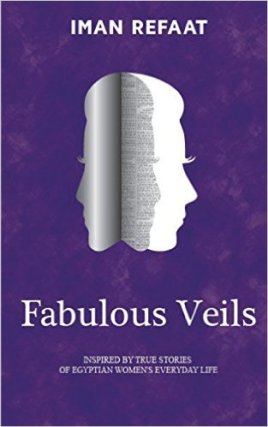Saturday February 25, 2017
By Alexandra Kinias
 All the women Gameela consulted, in Iman Refaat’s intriguing first novel, advised her not to destroy her marriage. “The shadow of a man is better than a shadow of a wall,” they told her. “For the sake of your children [don’t ask for a divorce]. You will be rejected. Women will avoid you in fear of stealing their husbands. You will disgrace your family, ruin your reputation. Men make mistakes,” they asserted her, “but a good woman is the one who protects her home and her family.”
All the women Gameela consulted, in Iman Refaat’s intriguing first novel, advised her not to destroy her marriage. “The shadow of a man is better than a shadow of a wall,” they told her. “For the sake of your children [don’t ask for a divorce]. You will be rejected. Women will avoid you in fear of stealing their husbands. You will disgrace your family, ruin your reputation. Men make mistakes,” they asserted her, “but a good woman is the one who protects her home and her family.”
Fabulous Veils
By Iman Refaat
305 pp, Iman Refaat Paradigm Shift
 Gameela is one of the three women that Refaat has masterfully woven their stories in her novel “Fabulous Veils,” which takes place in contemporary Cairo. Gameela’s story is not unique. She’s among millions of women living in Egypt, a country of diverse social class, the land of the haves and have nots, and those who vacillate in between. The gap between classes is gigantically shocking and Refaat skillfully drafts the comparison between their lives. Madiha, the second character, belongs to the class of the untouchables, living in large estates surrounded by tall, detached from the outside world. In contrast, Fatma, the third woman in the story, belongs to the underprivileged, living in crammed spaces, not large enough to stretch their arms, yet thankful for a roof over their heads.
Gameela is one of the three women that Refaat has masterfully woven their stories in her novel “Fabulous Veils,” which takes place in contemporary Cairo. Gameela’s story is not unique. She’s among millions of women living in Egypt, a country of diverse social class, the land of the haves and have nots, and those who vacillate in between. The gap between classes is gigantically shocking and Refaat skillfully drafts the comparison between their lives. Madiha, the second character, belongs to the class of the untouchables, living in large estates surrounded by tall, detached from the outside world. In contrast, Fatma, the third woman in the story, belongs to the underprivileged, living in crammed spaces, not large enough to stretch their arms, yet thankful for a roof over their heads.
 In spite of the massive extremes in their living conditions, the three women equally share the crowded streets of Cairo, breath its polluted air and suffer the same inequality and discrimination their gender brings upon them. On the surface, the lives of these women couldn’t be more diverse, but as we turn the pages, we realize that they share the same vulnerability and helplessness enforced upon them by the various variables that their status dictates, which at core is the same. As the laws, culture, misogynist mentalities and social habits governing the lives of women don’t discriminate between classes. They are exposed to the same restrictions and oppression.
In spite of the massive extremes in their living conditions, the three women equally share the crowded streets of Cairo, breath its polluted air and suffer the same inequality and discrimination their gender brings upon them. On the surface, the lives of these women couldn’t be more diverse, but as we turn the pages, we realize that they share the same vulnerability and helplessness enforced upon them by the various variables that their status dictates, which at core is the same. As the laws, culture, misogynist mentalities and social habits governing the lives of women don’t discriminate between classes. They are exposed to the same restrictions and oppression.

Gameela married Sherif, against her family’s wishes, merely to escape their suffocating control. Over the years, she realized that she had substituted one jailor with another. Sherif controlled her, emotionally abused her and forced her to abandon her dreams. When she discovers his infidelity, she could not confront him, and instead she continued her life with him pretending nothing had happened, as good wives, for the sake of the children. Unfortunately, her sacrifices were met by more abuse.
 Madiha, lives in a bubble and her life is controlled by her mother, who pulls her strings like a master puppeteer. A failed forced marriage draws Madiha into deep depression, and she makes drastic decisions to change her life, at the expense of her own daughter’s estrangement.
Madiha, lives in a bubble and her life is controlled by her mother, who pulls her strings like a master puppeteer. A failed forced marriage draws Madiha into deep depression, and she makes drastic decisions to change her life, at the expense of her own daughter’s estrangement.
Fatma belongs to the underprivileged and marginalized class. She worked every day of her life, to feed her kids, after her husband shrugged their responsibilities off his shoulders, and to pay him part of her salary, to allow her to work. Fatma also paid her dues in this dysfunctional marriage with years of domestic violence and martial rape. “At first, I was saddened and hurt, not that I wasn’t used to kicks, fists and slams. I was just too naïve thinking that my husband was different from my father.” Fatma explains how she felt after her husband assaulted her a week after their marriage.
The life journey of the women in “Fabulous Veils” is painful. Refaat’s scenes are vividly written, oozing with heart wrenching details of the emotional traumas women suffer from in silence.

Domestic violence, female genital mutilation, divorce laws, sexual harassment, oppression, confinement, segregation and marital rape are among many of the issues the book addresses. Truthful to the cause, Refaat didn’t bring closure to the stories, because there is no resolution for these issues in real life. However, through the dark clouds overcasting the lives of women in Egypt, Refaat introduces a ray of hope, represented in the new generation of young women rebelling against the status quo.
When Madiha’s daughter returns from Europe where she studies, she embarks on a journey searching for Fatma, her mother’s help, who had vanished in thin air. This eye-opening journey introduces the young woman to the social ailments invisible to her class and status. Shocked by her discoveries, the young feminist at heart rebels against the status quo, adopts women’s issues and fights for them.
Fabulous Veils is not just a novel about women, but an outcry for a social revolution. It’s a call for women not just to demand change or wish for it, but to go out and fight for it.

[…] The Fight for Women Rights – Book Review […]
LikeLike
[…] https://womenofegyptmag.com/2017/02/25/the-fight-for-women-rights/ […]
LikeLike